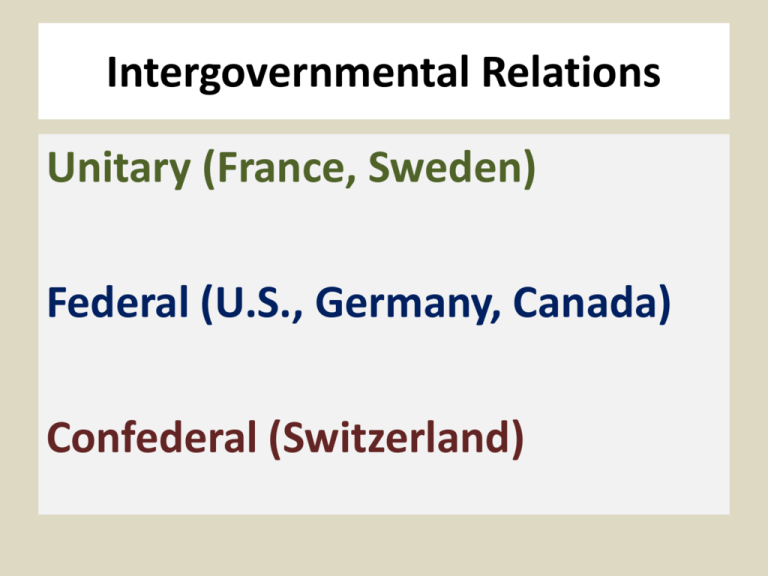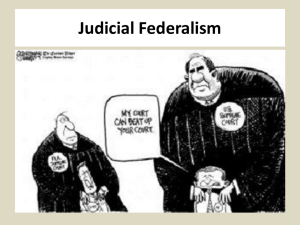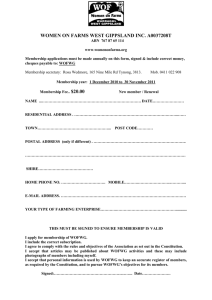Judicial Federalism
advertisement

Intergovernmental Relations Unitary (France, Sweden) Federal (U.S., Germany, Canada) Confederal (Switzerland) Two Origin Stories Popular Constitution Constitution is expression of “We the People” ratified by popular convention in states. Union is indivisible so long as people are. Compact Theory Constitution is compact joined by states who are sole members and can be dissolved by any single state. Utah Constitution Article I, Section 3. [Utah inseparable from the Union.] The State of Utah is an inseparable part of the Federal Union and the Constitution of the United States is the supreme law of the land. Martin v. Hunter's Lessee Marshall served as Martin’s atty, father had surveyed much of disputed land Spencer Roane was neighbor and personal enemy of Marshall Joseph Story – nominated by James Madison, became first professor of constitutional law at Harvard, writes first major commentary on constitutional law Art. I, Sec. 10 No state shall enter into any treaty, alliance, or confederation; grant letters of marque and reprisal; coin money; emit bills of credit; make anything but gold and silver coin a tender in payment of debts; pass any bill of attainder, ex post facto law, or law impairing the obligation of contracts, or grant any title of nobility. Nullification and Interposition Nullification: State declares federal law null and void Interposition: State interposes its sovereignty between the federal government and its institutions or individuals. Worcester v. Georgia (1832) GA required whites living in Cherokee lands to take oath pledging loyalty to state – jailed missionaries for refusing and supporting Cherokee land claims Sup Ct held that GA did not have power to impose such laws in Cherokee country. Worcester v. Georgia (1832) Georgia legislature resolves: "Any attempt to reverse the decision of the Superior Court [of GA]... by the Supreme Court of the United States, will be held by this State as an unconstitutional and arbitrary interference in the administration of her criminal laws and will be treated as such." Worcester v. Georgia (1832) Justice Story: “The court has done its duty, now let the nation do theirs.” President Jackson (apocryphal): “John Marshall has made his decision, now let him enforce it.” Nullification Crisis Congress passed significant tariffs South Carolina had major import/export economy South Carolina declares tariffs null in port of Charleston and provides punishment of any federal agent attempting to enforce tariff law Nullification Crisis Andrew Jackson: The laws of the United States must be executed ... Those who told you that you might peaceably prevent the execution have deceived you.... Disunion by armed force is treason. Are you really ready to incur its guilt? Michigan v. Long (1983) MI police search Long’s car/ find drugs MI Supreme Court finds search illegitimate, seemingly relies on federal 4th Amendment cases, rather than MI Constitution, but reaches different result than U.S. Sup Ct UT Constitution - Religious Freedom Article I, Section 4. [Religious liberty.] The rights of conscience shall never be infringed. The State shall make no law respecting an establishment of religion or prohibiting the free exercise thereof; no religious test shall be required as a qualification for any office of public trust or for any vote at any election; nor shall any person be incompetent as a witness or juror on account of religious belief or the absence thereof. There shall be no union of Church and State, nor shall any church dominate the State or interfere with its functions. No public money or property shall be appropriated for or applied to any religious worship, exercise or instruction, or for the support of any ecclesiastical establishment. U.S. v. UT Constitution - Gun Rights US, Amendment 2: A well regulated militia, being necessary to the security of a free state, the right of the people to keep and bear arms, shall not be infringed. Utah, Article I, Section 6. [Right to bear arms.] The individual right of the people to keep and bear arms for security and defense of self, family, others, property, or the state, as well as for other lawful purposes shall not be infringed; but nothing herein shall prevent the Legislature from defining the lawful use of arms Bowers v. Hardwick (1986) Majority found that federal Constitution’s 14th Amendment does not “extend a fundamental right to homosexuals to engage in acts of consensual sodomy.” Kentucky v. Wasson (1992) KY Supreme Court finds both rights against anti-gay discrimination and sexual privacy within state constitution. Ct found that law "infringed upon the equal protection guarantees found in the Kentucky Constitution.“ KY followed similar state Sup Ct decisions in NY, PA, and lower court decision in MI Same sex marriage and states










